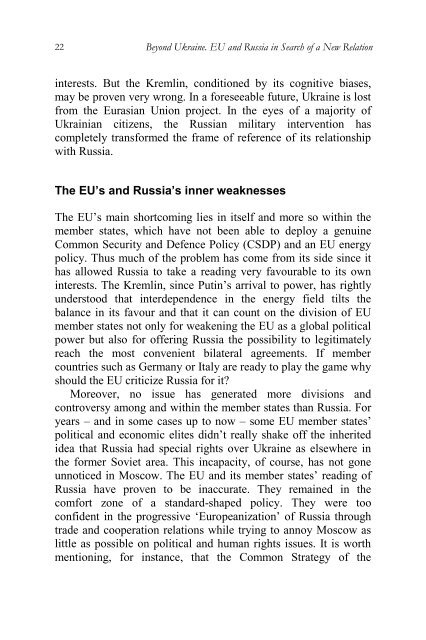beyondukraine.euandrussiainsearchofanewrelation
beyondukraine.euandrussiainsearchofanewrelation
beyondukraine.euandrussiainsearchofanewrelation
Create successful ePaper yourself
Turn your PDF publications into a flip-book with our unique Google optimized e-Paper software.
22 Beyond Ukraine. EU and Russia in Search of a New Relation<br />
interests. But the Kremlin, conditioned by its cognitive biases,<br />
may be proven very wrong. In a foreseeable future, Ukraine is lost<br />
from the Eurasian Union project. In the eyes of a majority of<br />
Ukrainian citizens, the Russian military intervention has<br />
completely transformed the frame of reference of its relationship<br />
with Russia.<br />
The EU’s and Russia’s inner weaknesses<br />
The EU’s main shortcoming lies in itself and more so within the<br />
member states, which have not been able to deploy a genuine<br />
Common Security and Defence Policy (CSDP) and an EU energy<br />
policy. Thus much of the problem has come from its side since it<br />
has allowed Russia to take a reading very favourable to its own<br />
interests. The Kremlin, since Putin’s arrival to power, has rightly<br />
understood that interdependence in the energy field tilts the<br />
balance in its favour and that it can count on the division of EU<br />
member states not only for weakening the EU as a global political<br />
power but also for offering Russia the possibility to legitimately<br />
reach the most convenient bilateral agreements. If member<br />
countries such as Germany or Italy are ready to play the game why<br />
should the EU criticize Russia for it?<br />
Moreover, no issue has generated more divisions and<br />
controversy among and within the member states than Russia. For<br />
years – and in some cases up to now – some EU member states’<br />
political and economic elites didn’t really shake off the inherited<br />
idea that Russia had special rights over Ukraine as elsewhere in<br />
the former Soviet area. This incapacity, of course, has not gone<br />
unnoticed in Moscow. The EU and its member states’ reading of<br />
Russia have proven to be inaccurate. They remained in the<br />
comfort zone of a standard-shaped policy. They were too<br />
confident in the progressive ‘Europeanization’ of Russia through<br />
trade and cooperation relations while trying to annoy Moscow as<br />
little as possible on political and human rights issues. It is worth<br />
mentioning, for instance, that the Common Strategy of the


